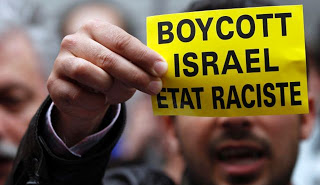If there’s no success like failure, as Dylan once wrote, then equally there’s no failure quite like success! Speak to any Zionist and they are eager to profess how ineffective BDS is. On the other hand the Israeli government has been going to extraordinary lengths to combat Boycott, culminating in a law passed last year that virtually made support for Boycott illegal in Israel
.
Israel and its apologists have a vested interested in playing down the success of Boycott. Just as people used to say that however evil Hitler was, at least he built the autobahns and made the trains run on time, so Israel makes play of how computer chips are made in Israel. What they omit is that American firms like Intel, who are the ones subcontracting firms in Israel, will do no different from their counterparts in South Africa when they realise the game is up. And of course South Africa also used to trumpet its scientific successes like the first heart transplant of Dr Christian Barnard.
But the success of BDS will not be economic primarily, although that will of course be important, but in the crucial area of culture and prestige. That is why the cultural boycott produces such ire and why Israel reacted with such vehemence to the academic boycott.
The reason that the Israel Embassy organises high powered conferences about a subject they profess so little concern about is that their real concern is what they call ‘deligitimisation’. Once it is accepted that a Jewish state is an inherently racist state that confers privilege on those identified as Jewish, in just the same way as Whites were privileged in South Africa, then the days of Israel are truly numbered. That in part explains the paranoia that Israel’s supports evince towards anything to do with Boycott.
Faced with boycott campaigns, Israel organizes legal seminar in London
Over a hundred European lawyers set to discuss various legal aspects of pro-Israel advocacy and universal jurisdiction law amid attempts by Israel’s critics to engage in so-called ‘lawfare.’
 |
| A demonstrator displays a sign reading “Boycott Israel, racist state” outside the Belgian foreign affairs building during a protest in Brussels, May 31, 2010. Photo by Reuters |
By Anshel Pfeffer | Jun.17, 2012
LONDON – One hundred and fifty lawyers from around Europe have gathered in London on Sunday for a two-day seminar, organized by the Israeli embassy in Britain, to discuss the various legal aspects of pro-Israel advocacy.
The seminar is taking place amid growing concern regarding boycott campaigns and as part of the emphasis Israel’s foreign service is recently putting on legal activism and the attempt of Israel’s critics to employ what is dubbed as “lawfare.”
The seminar is the initiative of Ambassador Daniel Taub, who before his appointment to the Court of St. James a year ago served as the deputy legal adviser at the Foreign Ministry in Jerusalem.
In addition to lectures and workshops by the embassy’s diplomatic staff and other experts, the participants will be addressed by Israel’s Supreme Court Judge Elyakim Rubinstein and Colonel (res.) Pnina Sharvit-Baruch, a lecturer at Tel Aviv University and former commander of the International Law Department in the IDF’s Military Attorney General Corps.
“The lawyers hail from Britain and around Europe, mainly Jewish but not only, who are active or want to be active in various legal and public-affairs fields in support of Israel,” explained one of the seminar’s participants.”This is an important opportunity for them to network, connect with the foreign ministry and receive useful background information.”
The seminar, taking place in a London hotel, was closed to the media by the embassy.
The subjects of discussion include the universal jurisdiction laws that permit the arrest of high-ranking Israeli officers and officials in some European countries over allegations of war-crimes.
Last year, Britain altered its universal jurisdiction law, allowing only the Director of Public Prosecution to issue universal jurisdiction arrest warrants, but the Israeli government is still concerned that this is insufficient. Other issues include facing the BDS (boycott, divestment, sanctions) movement, lobbying and legal action against Iran’s financial system, tackling anti-Semitism and the de-legitimization of Israel.
The Embassy in London would not comment on the seminar.
